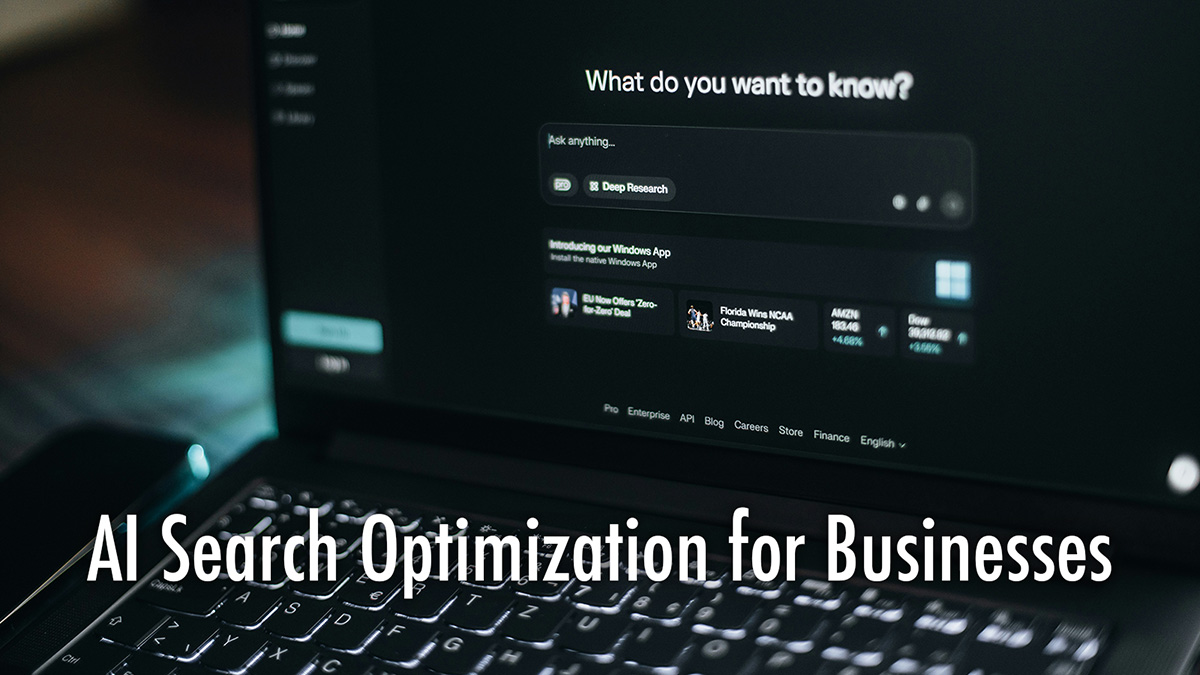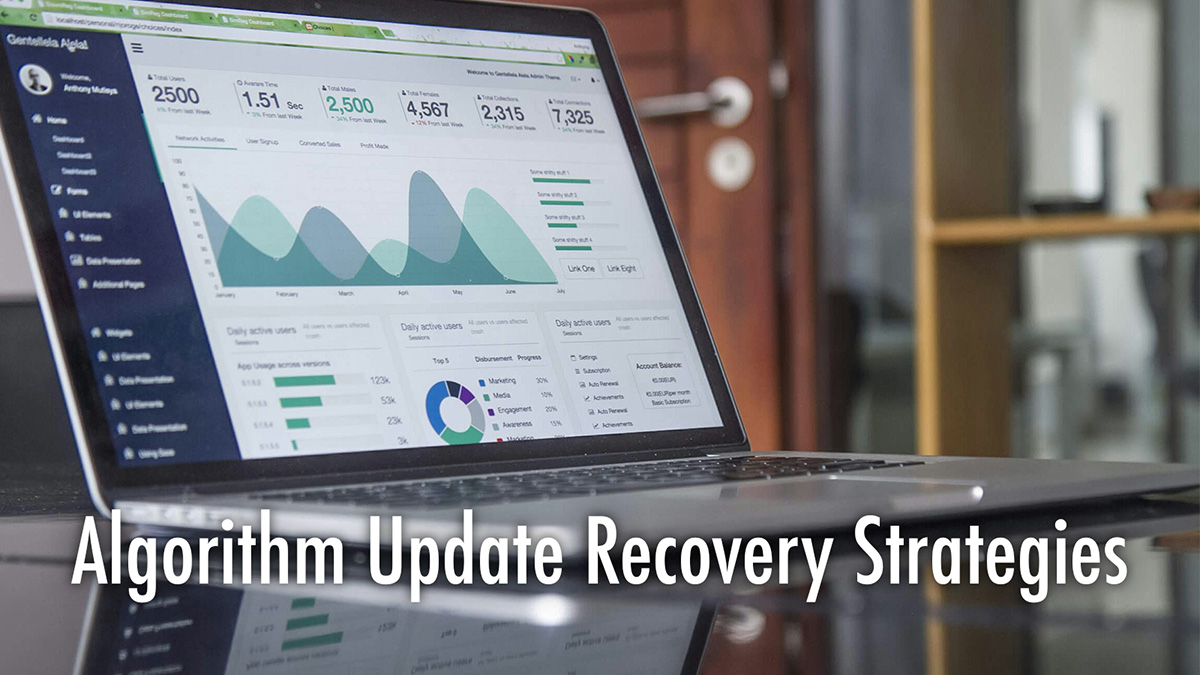AI Search Optimization: How to Get ChatGPT, Claude & Perplexity to Recommend Your Business

Dane Collins
Published on July 16, 2024

A lot of my marketing friends think SEO is over because search engines are dying. First, I don’t accept that search engines are dying (at least, not yet), but even if I did, a lot of the strategies that applied to SEO still apply to AI search optimization. Still, there are important differences to understand.
What is dying is obsessing over a #1 ranking on Google. Not only are more people asking ChatGPT, Claude, and Perplexity for recommendations, bypassing search entirely, but when they do search on Google, studies are finding that, because of AI, they’re being more verbose in their searches. They’re providing details and context around their searches. And that means ranking #1 for one of your head terms might not mean as much as it used to, but making your business the answer to someone’s needs might be valuable.
ChatGPT gets 3.8 billion visits a month. Google’s AI Overviews are showing up in over half of all searches, and that number is growing.
I’ve spent the last few years, as this trend has developed, researching, studying, and experimenting with AI search optimization, and I want to share what I’ve learned with some practical strategies you can use to get your business recommended by AI tools.
Why AI Search Is Different from Traditional SEO
Traditional search was pretty simple for the user. You’d type “best pizza NYC” into Google and get a list of 10 blue links to choose from.
But people don’t just drop a term into AI search platforms. When someone asks ChatGPT about the best pizza in NYC, they typically ask in the form of a question and provide context and specifics. Google searches average 4 words, while AI prompts average 23 words. People are having conversations with these tools. This is because AI search engines use large language models (LLMs) that understand context and nuance, not just keywords. Then the AI platform writes a detailed response tailored to the user, synthesizing information from multiple sources. Sometimes it mentions specific restaurants by name. Sometimes it includes their specialties. And so far, users generally trust the recommendations far more than they’ve trusted search algorithms.
Unlike traditional search results, AI responses include citations and source links directly in their answers. This makes it crucial that your content is not just discoverable, but citation-worthy and authoritative enough that AI systems will reference it as a trusted source.
The Technical Stuff (I’ll Keep It Simple)
AI crawlers can be far pickier than SERPs, as they curate the best results instead of ranking them on page after page.
First, speed matters more than ever. AI crawlers timeout after 1-5 seconds. Google might wait around for your slow site, but ChatGPT won’t.
Mobile optimization is absolutely critical, too. With mobile searches dominating, ensure your site is fully responsive and provides an excellent mobile experience. AI systems factor in mobile-friendliness when deciding which sources to reference.
JavaScript is your enemy here. I know that many people love their React apps, but GPTBot, ClaudeBot, PerplexityBot can’t see those sites. If you want AI to see your content, it needs to be in plain HTML. Server-side rendering isn’t optional anymore.
Here’s a quick robots.txt setup that works:
User-agent: OAI-SearchBot
User-agent: ChatGPT-User
User-agent: PerplexityBot
User-agent: ClaudeBot
Allow: /You might want to block the training bots though. That’s a different conversation.
Schema markup is more important than ever. AI systems are looking for as much context as possible, and the best way to provide them with that is with structured data. It helps them understand what your content is actually about. Focus on Article schema for blogs, FAQ schema for questions, and Product schema if you sell stuff.
Here’s a basic Article schema example:
{
"@context": "https://schema.org",
"@type": "Article",
"headline": "Your Article Title",
"author": {
"@type": "Person",
"name": "Your Name"
},
"datePublished": "2024-01-01"
}There’s also a new thing called llms.txt. Think of it like a cheat sheet for AI about your site. Upload it to /llms.txt and include your best content:
# Your Business Name
> What you do in one sentence
## Our Best Stuff
- [Ultimate Guide](https://yoursite.com/guide): Everything about [topic]
- [FAQ](https://yoursite.com/faq): Common questions answeredWriting Content That AI Wants to Quote
This is where a lot of people are messing up. They write for Google, not for AI.
AI systems prefer clear structure. Use proper headings and make them descriptive. “Introduction” is boring. “Why Small Businesses Need AI Search Optimization” tells a story.
Keep paragraphs short. Really short. Like this one. I break this rule all the time because it’s just how I write, but I’m told that it’s not ideal for AI.
Put your most important info first. If someone asks ChatGPT about your industry, you want your key points to be easy for AI to grab and use.
Tables are great for AI search. AI loves pulling data from well-formatted tables. Use clean headers, no empty cells, and clear information.
FAQs work incredibly well, too, but write them like real people ask questions. Not “What are the benefits of…” but “Why should I care about AI search?”
Here’s what many experts say works:
- Complete thoughts in each section
- No “as mentioned above” references
- Lots of examples
- Real data and statistics
- Expert quotes when you can get them
Getting AI to Actually Recommend You
Building authority matters more than backlinks now. AI systems care about who you are rather than who links to you. Get your team’s expertise out there. Publish original research. Build relationships with industry publications.
I saw a 40% boost in AI mentions for a client just by adding statistics and expert quotes to their content. Academic research backs this.
Each platform has its quirks:
ChatGPT prefers comprehensive, factual content. Original research does really well. It can now browse the internet in real-time with its search feature, making fresh, current content even more valuable.
Perplexity looks for citations. The more sources you reference, the better. Fresh content does best. Perplexity always searches the web in real-time, so keeping your content updated is essential for visibility here.
Google’s AI Overviews still care about traditional SEO signals, but they also need structured data.
Claude prefers authoritative, expert-level content. Think academic quality but readable.
Getting into “best of” lists is huge, especially for Perplexity. If TechCrunch lists you as a top startup, Perplexity will probably mention you. Same with G2 reviews, Clutch ratings, and industry awards.
Tracking This Stuff
Traditional analytics aren’t enough. You might need new tools.
Semrush’s Business plan ($499/month - yeah, it’s pricey) tracks AI Overviews and brand mentions across platforms. It’s worth it if you’re serious.
ZipTie.dev is $99 for basic tracking. It monitors your brand across ChatGPT, Perplexity, and Google’s AI.
For enterprise, you might look at BrightEdge.
But I recommend starting with manual testing. Once a month, ask AI tools about your brand and industry. Document what they say. Track how it changes.
What to measure:
- How often your brand gets mentioned
- The context of those mentions
- Whether it’s positive or negative
- If you’re getting cited as a source
- Any direct traffic from AI platforms
Real Companies Getting Real Results
The Search Initiative took an e-commerce client from $166K to $491K monthly revenue. That’s 196% growth.
Bankrate generates 125,000 monthly visitors from AI-optimized content. They use AI to write, but note that they use humans to edit. Human-made content generally outperforms.
Rocky Brands saw a 30% increase in search revenue. They used BrightEdge to find opportunities and track results.
A real estate company I know grew traffic 80% in four months. They used semantic markup and focused on writing helpful articles.
The pattern is human oversight, quality over quantity, testing everything, and watching competitors.
Google SEO vs AI Search Optimization
Traditional SEO was keyword-focused. Find the right keyword phrases, place them strategically, build links, optimize speed, and hope to rank higher.
AI search is about conversations and context.
People expect AI to understand context from previous questions. They want comprehensive answers, not just links.
Your content strategy needs to shift. Instead of targeting “best CRM software,” you’re answering “what CRM should a 50-person SaaS company use if they’re already using Salesforce for enterprise clients but need something simpler for SMB?”
Success metrics change completely. Forget just tracking rankings and traffic. Now it’s about mention frequency, citation quality, sentiment in AI responses.
What’s Coming Next (And How to Prepare)
Sundar Pichai says search will “change profoundly in 2025.” He’s not exaggerating.
AI Overviews jumped from 25% to 57% of searches in just months. And the shift is accelerating.
Multimodal search is exploding. Google Lens handles 20 billion visual searches a month. Voice search is used by 86 million Americans. Video search is growing fastest. Soon, people will search with images, voice, and text all mixed together.
A Plan of Action
Step 1: Get the basics right
- Check your content structure
- Fix your heading hierarchy
- Add FAQs to important pages
- Update robots.txt for AI crawlers
Step 2: Optimize your content
- Rewrite key pages conversationally
- Add tables and lists where they make sense
- Include real examples and data
- Get expert quotes if possible
Step 3: Technical improvements
- Add proper Schema markup
- Fix site speed issues
- Ensure mobile optimization
- Create video content with transcripts
- Improve internal linking
Ongoing: Monitor and adjust
- Track AI mentions monthly
- Test what’s working
- Update based on results
- Try new platforms as they emerge
Budget breakdown? Put 60% into content and expertise building. Save 30% for maintaining what you’ve got. Use 10% to experiment with new stuff.
Track these metrics immediately:
- Brand mentions in AI responses
- Quality of those mentions
- How often you appear in AI Overviews
- What AI says about you (positive? negative?)
- Traffic from AI platforms
The AI search revolution is happening whether we’re ready or not. Any company still waiting will be playing catch-up for the foreseeable future.
Got questions? Specific challenges with your site? Let’s talk about how to make AI search work for your business. This is too important to ignore.

About the Author
Dane Collins is a digital marketing expert & developer with 28+ years of hands-on experience helping SMBs grow through strategic implementation and optimization.
Learn more about Dane →